- Home
- Jodi Picoult
The Jodi Picoult Collection #3 Page 8
The Jodi Picoult Collection #3 Read online
Page 8
“There’s television people in my driveway,” Sophie announces.
Amazingly, the teacher’s smile never wavers. “Isn’t that interesting!” she says. “Why don’t you join Mikayla and Ryan’s group?”
As Sophie runs off, already focused on what’s next, the teacher draws us aside. “Ms. Hopkins, we read about your father’s arraignment in the paper. All of us here want you to know that if there’s anything we can do to help . . .”
“I’d just like Sophie to stay busy,” Delia replies woodenly. “She doesn’t really know what’s going on with my father.”
“Of course,” the teacher agrees, and she glances at me. “She’s lucky to have two supportive parents right now.”
Too late, she realizes this is probably not the smartest comment, given the circumstances. She blushes a deep red, then an even deeper hue when both Delia and I hasten to explain that I’m not Sophie’s father.
There have been times, I’ll admit, that I wished I was. Like when Delia put my hand on her belly so that I could feel Sophie kicking inside, and I thought: I should have been the one to make that happen. But for all the nights I lay in bed as a teenager, imagining what it would be like to be Eric, with the freedom to touch her whenever I wanted, or breathing in the smell of my pillow after she’d sprawled on my bed studying for a test on Hamlet, or even feeling my pulse jump when we were both patting Greta after a find and our hands brushed—for all those times, there were a thousand others that did not belong to me.
By now, the teacher is so tangled up in the kite strings of her embarrassment that she couldn’t fly straight if she wanted to. “We have to go,” I say to Delia, and I drag her out of the classroom. “I thought I’d save the poor woman before she put both of her feet in her mouth at once,” I explain. “How old is she? Eleven? Twelve?”
“I didn’t get to say good-bye to Sophie.”
We stop for a moment at the plate-glass window, watching Sophie make a block pattern out of colored circles and squares.
“She’ll never know.”
“I bet the teacher noticed. She’ll probably tell the school guidance counselor that I just picked up and left. They’re all waiting to see how far the apple falls from the tree, you know.”
“Since when do you care what anyone thinks about you?” I ask. “That’s the kind of crap I’d expect to hear from Bethany Matthews, not Delia Hopkins.”
I hear Delia suck in her breath at the sound of that forbidden name.
“Bethany Matthews,” I continue blithely, “is always the first one parked at the curb to pick up her daughter. Bethany Matthews thinks that the pinnacle of personal success is being president of the PTA for four consecutive years. Bethany Matthews never serves frozen pizza for dinner because she’s forgotten to defrost.”
“Bethany Matthews would not have gotten pregnant before she was married,” Delia says. “Bethany Matthews wouldn’t even let her daughter play with a child who was the product of that kind of broken household.”
“Bethany Matthews still wears velvet headbands,” I laugh. “And baggy granny underwear.”
“Bethany Matthews throws like a girl.”
“Bethany Matthews,” I say, “is no fun to be around.”
“Thank God I’m nothing like her,” Delia replies, and then she turns to me and smiles.
* * *
I dated Delia first. We were in middle school and it didn’t mean anything at all—if you said you were going out with a girl, it basically meant that you walked her to her bus at the end of the school day. I did it because everyone else seemed to be asking girls out, and Delia was the only one I really talked to. I broke up with her because as cool as it had been to have a girlfriend the week before, it was uncool to have one the following week. I told her that maybe we should spend a little time hanging out with other people.
I realized too late that the look on Delia’s face when I did it was one I had never seen before—and with good reason: It was the first time in our lives that any of us three wanted to ration the amount of time we spent in one another’s company. In a fit of conscience, I went to find Delia in the gym. I was going to tell her that I didn’t mean it, that words without thought behind them were like deflated balloons, unable to go anywhere, but instead I spied her dancing with Eric. He had his arms around her, with an easy confidence I didn’t have. He touched her as if parts of her belonged to him, and maybe, after all these years, they did.
On Eric’s face I saw my own mistake. It brightened his eyes and narrowed his focus so much that I thought of yelling Fire to see if he’d even hear. He looked the way I felt around Delia: as if a second sun was growing underneath my breastbone, a secret I could barely conceal. The difference, though, was how Delia was looking back at him. Unlike the hours we’d spent as an alleged couple—when we’d argue who would be the starting pitcher for the Sox, or whether Spider-Man could kick Batman’s ass in an arm-wrestling competition—Delia had nothing to say when she was staring up at Eric. He took away all her words, and I had never been able to do that.
There were times, when we were getting older, that I thought of telling her how I really felt. I convinced myself that even if I lost Eric’s friendship forever as a result, I’d still have Delia to make up for it. But then I’d remember that moment when she and Eric were swaying in the middle school gym, with streamers caught on the bottoms of their shoes and a DJ playing REO Speedwagon; and I’d realize that even if all three of us had grown up, Delia and Eric still looked at each other as if the rest of the world had fallen away, myself included. I could lose one of them, but I didn’t think I could stand to lose both.
Once, I slipped—I kissed her when we were horsing around on the shore of the Connecticut River. But I made a joke of it, the way I did when anything came too close for comfort. If I’d said what I really wanted to when she was floating with me in the reeds, her hands tight on my shoulders and her mouth a flower beneath mine, I might have wound up with her staring speechless at me, too. But what if it wasn’t because I took her breath away? What if it was because she couldn’t say back to me the things I said to her?
When you love someone, you want her to have everything she wants.
In Delia’s case, that has always been Eric.
* * *
The Grafton County Correctional Facility hunches like a sleeping bear at the end of Route 10 in Haverhill, yoked at the neck to its sister building, the courthouse. As we drive up and park my car, I can feel Delia’s eyes go straight to the razor wire at the top of the fence.
I get out of the car and open Delia’s door. She squares her shoulders and marches toward the entryway, a squat little addition with a heavy wooden door that makes me think of the ogre’s cottage in a fairy tale. The correctional officer at the desk looks up from the MAXIM he’s reading. “We’ve come to see an inmate,” I say.
“You a lawyer?”
“No, but—”
“Then come back Tuesday night during visiting hours.” He turns his attention back to his magazine.
“I don’t think you understand—”
“Nope, I never do,” the CO answers dully.
“My father was brought in here two days ago—”
“Then you can’t see him, period. It’ll be a few weeks before he’s approved for visitation.”
“My father won’t be here in a few weeks,” Delia says. “He’s being sent to Arizona.”
This, finally, gets his attention. There just aren’t all that many people in the Grafton County Jail who are on the short list for extradition to another state. “Hopkins?” the CO says. “You couldn’t meet with him even if I let you. He left this morning for Phoenix.”
“What?” Delia says, stunned. “My father’s not here? Does his lawyer know?”
The CO turns as a door is slammed nearby, followed by the sound of Eric cursing. “He does now,” the guard answers.
Eric sees us standing in front of the CO’s booth and does a double-take. “What are you doing here?�
�
“Why didn’t you tell me my father was leaving today?”
“Because no one told me,” Eric says, shooting a dirty look at the CO who led him out. “Apparently, neither the Arizona prosecutor nor the Grafton County Jail thought it might be important to let me know that my client’s been extradited.” He pulls out his wallet and digs through it. “You have any cash? I’m going to drive straight to the airport.”
I give him forty, Delia gives him fifty. “Do you even know where you’re going?”
“I have a seven-hour trip to figure it out,” Eric says. He stamps a kiss on Delia’s forehead. “Listen, I can handle this. In the meantime, find someone to watch the house for a while. Get tickets to Arizona for you and for Sophie. Bring a few of my suits and the box marked ‘Andrew’ that’s sitting on the desk at my office. I’ll call you on your cell as soon as I know more.”
The three of us walk outside, where it is still cold enough for the promises we are making to crystallize in the air. Eric heads to my car and tucks Delia into the passenger seat, leaning close to speak to her for a moment out of my range of hearing. I imagine him telling her that he loves her, that he will miss her, that when he closes his eyes on the plane her face will be what rises inside him—all the things I would be saying to her, in his place. After he closes the door, sealing her safely inside, he comes around the back of the car to talk to me. “I can’t handle this,” he says.
“You just said—”
“Well, what the hell was I supposed to tell her? Fitz, I’m totally screwed. I honestly don’t know what I’m doing,” Eric confesses. “I can count on one hand the number of felonies I’ve tried. I should have made her find another attorney. A real attorney.”
“You are a real attorney,” I say. “She wanted you because she knows you’ll do everything to get Andrew out of this mess.”
He rubs a hand down his face. “Then what am I supposed to do when he gets convicted and Delia blames me?”
“Make sure you never have to find out.”
“I’m screwed,” Eric repeats, and shakes his head. “I have to go. Take care of her, okay?”
He gives Delia to me as if she were a jewel to be smuggled, a prayer to be whispered between heretics. A pawn. Eric is halfway across the parking lot by the time I answer. “I always do,” I say.
II
How little remains of the man I once was, save the memory of him! But remembering is only a new form of suffering.
—Charles Baudelaire, La Fanfarlo
Delia
When I was little, I used to imagine the ways my mother would come back to me. I would be ordering a milkshake at a diner, and the woman sitting on the stool next to me would turn and our eyes would connect like lightning. Or I’d open the door and instead of the mailman, my mother would be standing there with her arms open. I’d go to my first driver’s-ed class in high school and slip into the car and find her waiting with a clipboard in the passenger seat, just as surprised as I was. In all these daydreams, death was not the absolute it is supposed to be, and we always found each other by accident. In all of these daydreams, my mother and I recognized each other without a single spoken word.
It is strange to think that, sometime in the past twenty-eight years, she might have been standing in line behind me at the grocery store. We might have passed each other in a bus station or on a crowded street. We might even have talked politely on the phone, No I’m sorry, you have the wrong number. It is strange to think that we might have crossed paths, and still not have known what we were missing.
* * *
You can boil your life down to a single suitcase, if you desperately have to. Ask yourself what you really need, and it won’t be what you imagine—you will easily toss aside unfinished work, and bills, and your daily calendar to make room for the pair of flannel pajamas you wear when it rains; and the stone your child gave you that is shaped like a heart; and the battered paperback you revisit every April, because it was what you were reading the first time you fell in love. It turns out that what’s important is not everything that you’ve accumulated all these years, but those few things you can carry with you.
Sophie presses her face to the tiny window of the plane, waiting for takeoff. It is her first flight. As far as my daughter knows, we are going on a spontaneous adventure. A vacation. I’ve told her that where we’re headed, it’s warm. That Eric is already there waiting for us.
Maybe my mother is, too.
She still hasn’t called. Maybe, like Fitz said, she’s afraid; maybe her attorneys have told her not to. Eric has explained to me that just because the State of Arizona is prosecuting after all this time doesn’t mean that my mother is pushing for it, or even that she’s still alive. An outstanding warrant is an outstanding warrant, period.
Every now and then I let myself think the darkest thought: that the reason she hasn’t contacted me is because she doesn’t want to. I cannot reconcile that mother with the one I’ve pictured for years.
But then again, if my mother was as perfect as I’ve always imagined, why would my father have run away with me? I’ve never doubted his love for me, but for that to still be true, given what I now know, do I have to doubt my mother’s love for me? And if I can’t, if I won’t, then don’t I have to admit to myself that my father has done something wrong?
When I told all of this to Eric, he said I’d find out soon enough if my mother is still living in Arizona, that I should just stop analyzing it to death, because it’s only going to make me crazy.
But if it were me, and Sophie, and it had been years . . . I wouldn’t listen to lawyers; I wouldn’t pay attention to misgivings. I would walk halfway across the world to stand on my daughter’s doorstep; I’d wait for her to answer the bell and hold her so close that nothing could come between us, not even the narrowest sliver of regret.
“Mommy?” Sophie asks. “Will they give Greta a seat belt?”
“She’s in a special crate,” I assure her. “She’s probably asleep by now.”
Sophie considers this. “Does she ever dream?”
“Sure,” I reply. “You’ve seen her running in her sleep.”
“I had a dream last night,” Sophie tells me. “Grandpa was taking me for ice cream, but no matter what you asked for, you got strawberry.”
“He hates strawberry,” I say quietly.
“But in my dream,” Sophie says, “he ate it anyway.” She twists in her seat to face me. “Will Grandpa be on the other side?”
She means in Arizona, but that isn’t how I hear it. I’d always thought of my father and me as a unit, a team, but now I’m not sure. On the one hand, I was his child, and he must have been doing what he felt he needed to do. On the other hand, I’m a mother now, and he committed my worst nightmare.
Sophie snuggles against me, twining her fingers in my hair. She used to sleep with it the way some babies sleep with a blanket or a teddy bear; every time she lay down for a nap I’d have to go with her. Eric thought it was a habit we should break; how else would she ever be able to go to sleep without me?
I had asked him, Why should she ever have to?
The Fasten Seat Belt sign dings, and I help Sophie into her seat and tighten the band around her waist. The plane pushes off from the jetway and rolls backward, heading onto the tarmac for takeoff. When the plane begins to accelerate and the nose rises up like a rocket, Sophie turns to me. “Are we flying?”
My father and I used to have picnics at the airfield in Lebanon and watch the Cessnas and Pipers take off and land. We’d lie on our backs with the grass tickling our shoulders as the little planes vanished into colossal clouds, then reappeared like magic. When I asked him what kept a plane from falling out of the sky, he made me sit up and blow across the top of a paper napkin to see it rise like a flag in the wind. “When the air moves faster on the top of the wings than the bottom,” he told me, “the plane lifts.”
So I am ready when Sophie asks me this question. It’s all about pressure. When it
comes at you from all sides equally, nothing moves. But if one side exerts more than the other, you just might find yourself in flight.
* * *
I wonder if she has dimples, like me. If she can bend her thumbs all the way backward, double-jointed, like Sophie and I can. If she gave me my black hair or my fear of insects. If her labor was anything like mine.
I have spent so long sculpting her in my imagination, a combination of Marion Cunningham and Carol Brady and Ma Walton and Mrs. Cosby. She will cry when she sees me and hold me so tight that I can’t breathe, and even then I will notice how seamlessly my body fits against hers. She will not be able to find words big enough to tell me how much she loves me.
But there is another voice in my head, one that knows things are different if my mother has, in fact, been alive all this time. Why didn’t she try harder to find me?
All I ever really wanted in a mother is someone who could not be dragged from me, kicking and screaming, no matter how powerful the force of separation was. Someone who would give up her life if it meant I couldn’t be a part of it.
Someone my father has always been.
* * *
When I fall asleep during the flight, I dream. He has just finished planting a lemon tree in my backyard. I want to make lemonade, but there isn’t any fruit on the tree yet. It looks naked under that electric sky; all angles and switchbacks, skinny arms shivering.
His hands pat the dirt down at the bottom of the tree. He turns to me but the sun is in my eyes and I smile back without really seeing his face. In my lap is a striped cat; I feel for the missing stub of its tail and it bolts out of my clutches, between two barrel cacti that remind me of munchkins from The Wizard of Oz. “What do you think, Beth?” he asks.
The dust stains his palms red, and when he wipes them on his jeans there are two upside-down five-fingered prints that become long-necked dinosaurs with their heads reaching toward each other. I think I want a dinosaur. I want a seal, too, to keep in the bathtub.

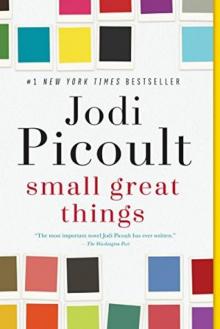 Small Great Things
Small Great Things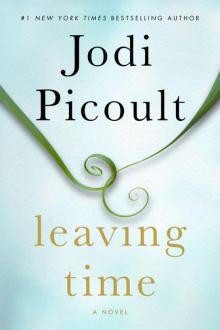 Leaving Time
Leaving Time Nineteen Minutes
Nineteen Minutes Larger Than Life
Larger Than Life Perfect Match
Perfect Match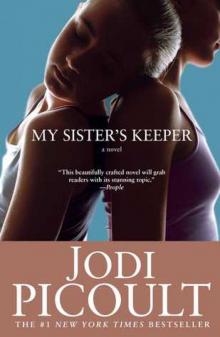 My Sister's Keeper
My Sister's Keeper The Pact
The Pact Handle With Care
Handle With Care Songs of the Humpback Whale
Songs of the Humpback Whale Mermaid
Mermaid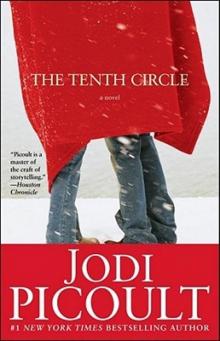 The Tenth Circle
The Tenth Circle The Color War
The Color War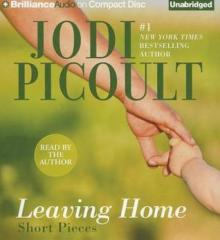 Leaving Home: Short Pieces
Leaving Home: Short Pieces House Rules
House Rules Lone Wolf
Lone Wolf The Storyteller
The Storyteller The Book of Two Ways
The Book of Two Ways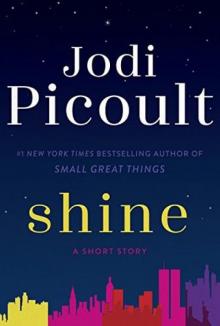 Shine
Shine Off the Page
Off the Page Sing You Home
Sing You Home Second Glance: A Novel
Second Glance: A Novel Mercy
Mercy Vanishing Acts
Vanishing Acts Between the Lines
Between the Lines Plain Truth
Plain Truth Salem Falls
Salem Falls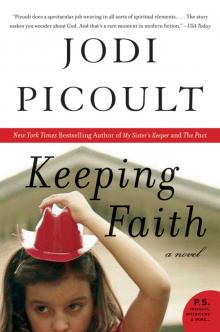 Keeping Faith
Keeping Faith Harvesting the Heart
Harvesting the Heart Change of Heart
Change of Heart Where There's Smoke
Where There's Smoke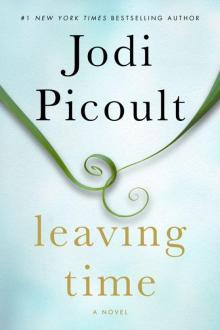 Leaving Time: A Novel
Leaving Time: A Novel Over the Moon
Over the Moon House Rules: A Novel
House Rules: A Novel The Jodi Picoult Collection #2
The Jodi Picoult Collection #2 Leaving Home: Short Pieces (Kindle Single)
Leaving Home: Short Pieces (Kindle Single) My Sister's Keeper: A Novel
My Sister's Keeper: A Novel![Mermaid [Kindle in Motion] (Kindle Single) Read online](http://i1.bookreadfree.com/i1/04/03/mermaid_kindle_in_motion_kindle_single_preview.jpg) Mermaid [Kindle in Motion] (Kindle Single)
Mermaid [Kindle in Motion] (Kindle Single) The Jodi Picoult Collection #4
The Jodi Picoult Collection #4 Sing You Home: A Novel
Sing You Home: A Novel The Jodi Picoult Collection
The Jodi Picoult Collection Lone Wolf A Novel
Lone Wolf A Novel Second Glance
Second Glance Larger Than Life (Novella)
Larger Than Life (Novella) The Jodi Picoult Collection #3
The Jodi Picoult Collection #3